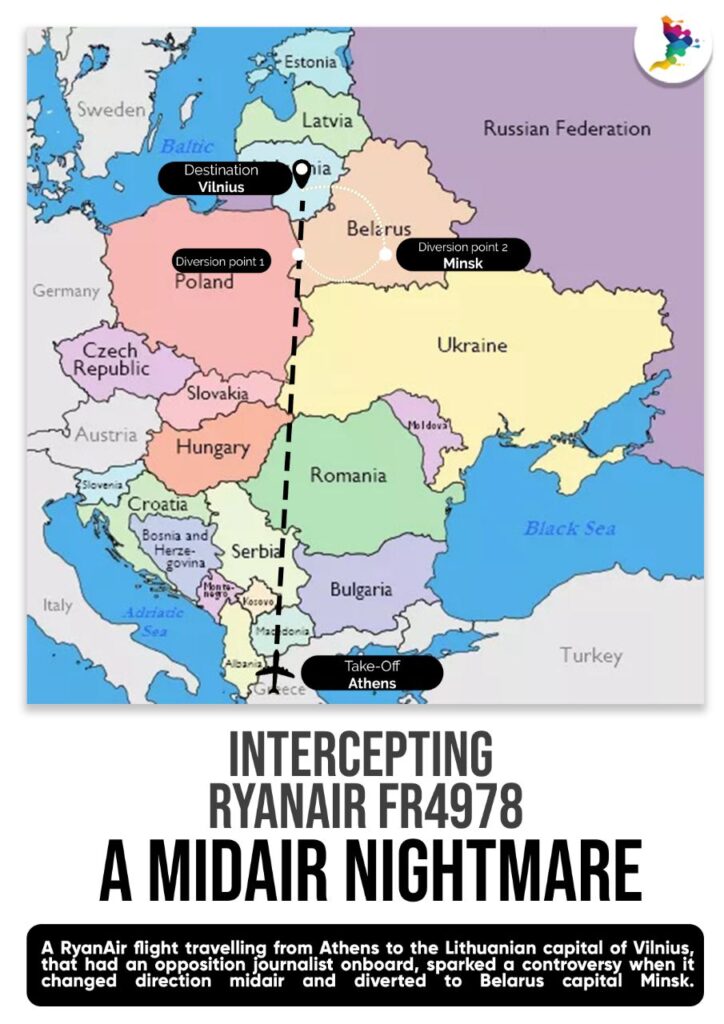On May 23, Belarus forced down Ryanair Flight FR4978 to land in capital Minsk through a fake bomb scare. The engineering of threat was intended to arrest 26 year old journalist Roman Protrasevich.
Protrasevich is the co-founder and former editor in chief of NEXTA, a Telegram news channel based in Poland, which is now a cherished and reliable independent media outlet engaged in real time reporting about the authoritarian regime of President Lukashenko. Fearing the arrest for his critical reporting on Lukashenko’s authoritarian regime, Protrasevich left the country in 2019, to live in an exile in Lithuania.

Infamously referred as ‘Europe’s last dictator’, Alexander Lukashenko, the President of Belarus, since 1994 faced a tough challenge in the last general elections held in August 2020. The results which declared him the winner for the sixth consecutive term were denounced by many. Opposition leader Svetlana Thikanovasakaya, who is living in exile in neghbouring Lithuania, along with international observers claimed the election results to be rigged. The very announcement of results sparked mass protests across the country.
Lukashenko, insecure as ever, ramped up his clampdown on Media outlets in wake of post election protests. Opposition leaders, media outlets, activists and numerous organisations were charged of inciting public disorder and social hatred. In November 2020, Protrasevich too was charged with the same. The mid air incident with Ryanair flight was a culmination of series of attempts to arrest the journalist.
The mid air interception has triggered global condemnation. Aviation bodies in particular are worried about the long term implication of the development.

To unravel the implications of the episode on International aviation dynamics, The Voices Interviews Aviation journalist and Corporate Communication specialist in aviation, Alejandro Muñiz Delgado (Spain).
- Belarus is a signatory to a few major international aviation protocols. Tell us briefly about those protocols and your primary take on the incident being breach of those protocols.
I believe Belarus’ action is unprecedented. Making an excuse to force a plane to land seems like an unusual event, especially when it was closer to the destination airport, Vilnius, than to Minsk. Some sources mention an email warning about the alleged Hamas bomb, but that email was apparently sent after the plane had already started the diversion.

(Graphic by: Ishaan Pareek)
Belarus is an ICAO (International civil Aviation Organisation, Canada) member, and its board has met to determine whether any rule of the Chicago Convention has been breached. Whether United Nations will take action against Belarus it is yet to be seen. For the moment, they are going to open an investigation following article 55 of the Chicago Convention.
The Belarusian Air Force’s scramble sent MiG-29 planes that are also fighters that can fire air-to-air. So, the pilots had no choice but to follow directions. There is always the safety matter, which was the trump card they wielded through the Minsk air traffic controllers. Detours are common and happen every day, but nobody on board imagined it was to stop a journalist. We should also not forget that for several hours passengers of different nationalities were held hostage until the plane took off again. For this reason, most political voices agree on calling what happened a ‘kidnapping’.
National airspaces are part of the sovereignty of a country, but aircraft belong to the country in which they are registered. In this case, the Ryanair aircraft of flight FR4978 was Polish, and the company is Irish as we know. It was a flight that connected two cities of the European Union flying over a country that is not. It is a complicated fact and that is why sanctions and recommendations have been taken. In fact, ICAO has registered in several messages stating it has no power to close national airspaces as requested by many people. It is not agency or police that can impose sanctions. Conceived at the Chicago Convention in 1944, this norm is based on peace and cooperation among nations in a diplomatic way and it is the NSA of each country that ensures compliance with these rules. “Each Contracting State undertakes not to use civil aviation for any purpose incompatible with the purposes of this Convention,” says Article 4.
- How would you analyse the response of international aviation community and bodies to the incident? Do you think airspace boycott is an apt reply?
I believe that the international community has reacted quickly taking into account the sensitivity of the matter, to follow up in depth what happened. First, countries like Lithuania, which is at the center of the crisis, because it is where the opponents have emigrated, established the first restrictions. Then France, the United Kingdom, Latvia, Ukraine and the EU, through their European Council, have followed, indicating the sanctions to be adopted by the Council of the European Union and the Commission.
There have always been zones of conflict, dangerous or at war. Boycotting airspace over one of these zones it is a mandatory first security measure when confidence is lost in a geographic area. Security is based on information, transparency and many complementary measures taken by different actors (regulators, company, countries, governments …), procedures and contingency plans in the event of any unforeseen event that may arise. If certain guarantees or safety standards are not given with truthful information, shared by the authorities, who would dare to fly over there?
Now a contagion effect is taking place towards Russia that is blocking some flights that had previously bypassed Belarusian airspace. Now they cannot fly into Russia because they do not accept their flight plans. It remains to be seen what will happen now.
- What are the chances of Belarus being made answerable for this enforced landing via mechanisms inherent in the international Aviation protocols which it is signatory to?
In addition to the ICAO inquiries following Article 55 of the Chicago Convention, United States and several European countries have requested an investigation at the United Nations Security Council. This situation will have to be resolved through diplomatic channels with some changes or gestures from Belarus. Perhaps one of the parties involved, such as Ryanair, could sue the Belarusian government for damages. It remains to be seen how this evolves.
Economic sanctions on companies that finance the regime and the aviation sector will have an impoverishing effect on the Belarusian economy. But, at the end, the one who continues to suffer is the people of Belarus who will not be able to leave their country by plane.
- What may be the repercussions in context of Aviation dynamics if international community allows Belarus to escape the proper answerability for what is being called “State sponsored hijack”? How possible is a regime wherein flight companies operate with fear more than ever?
This crisis can become entrenched, and the airspace blockade could last in time. The EU has warned that it could escalate with if Russia intervenes. Annexing Belarus is even on the table. Currently there are other countries that are not flying over Ukraine as well, after the downing of the MAS plane. It only operates national traffic or destination to Ukraine, no international overflights. The same is true in conflict areas like Syria. Belarus may see its international connections reduced by airlines such as Belavia that flew to European destinations and could be isolated allowing only with flights to Russia and China.
- The so-called diplomatic maneuvering was the cited reason which led to landing of the Plane of Bolivian President in Austria in 2013. Would you like to relate the Belarusian episode to other such incidents? Or what makes it a far bigger threat to imagination and vision of a rule based international standard regime?
The case of the Evo Morales’s plane has been deliberately placed in the conversation to add to the noise and confusion. It is true that the Falcon 900 FX aircraft of the then president of Bolivia did not obtain access to the airspace of France and Portugal due to the rumor that the former NSA agent Edward Snowden was on board. But its detour to Vienna was not due to a threat to the flight, so it is different. He then refueled in Gran Canaria, before crossing the Atlantic. The autonomy of these aircraft is less than a commercial one like that one of Ryanair. He was coming from Moscow and was supposed to arrive in La Paz. Morales’s plane was a state aircraft and Ryanair’s did not have such treatment.
There are other past examples of air hijackings by people who were on board, but there are no examples of forced diversions due to fabricated causes, such as this one in Belarus, so I do not see a relationship with other incidents.
- What according to you is the learning outcome of the development for international community?
Aviation is based on the mutual trust of all the parties involved: airlines, controllers, technicians, pilots … and that also applies among countries when a plane flies internationally. Operating with transparency is cardinal in aviation. But we do not live in an ideal world and international relations must deal with these kinds of dictatorial regimes. And, of course, this affects aviation. From this crisis, we learn that we must act as a united democratic block against these authoritarian governments to ensure deepened and exhaustive strategic and logistical cooperation.
Interview by NK Jha
Interview Edited by: V Prem Shanker
Infographic Credit: Ishaan Pareek

